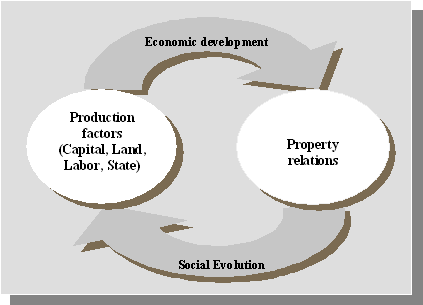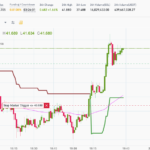During its history, capitalism has been the subject of criticism from many perspectives. The range of criticisms comes from people who disagree with the principles of capitalism in its entirety, to those who disagree with particular outcomes of capitalism. Among those wishing to replace capitalism with a different method of production and social organization, a difference can be made between those believing that capitalism can only be overcome with revolution (e.g., revolutionary socialism) and those believing that structural change can come gradually through political reforms to capitalism (e.g., classic social democracy).
The term mode of production, based on Marx, refers to the specific organization of economic production in a given society. A mode of production includes the means of production used by a given society, such as factories and other facilities, machines, and raw materials. In additional to that, it also includes labor and the organization of the labor force.
The term relations of production, based on Marx, refer to the relationship between those who own the means of production (the capitalists or bourgeoisie) and those who do not (the workers or the proletariat). History evolves through the interaction between the mode of production and the relations of production, according to Marx. The mode of production constantly evolves toward a realization of its fullest productive capacity, but this evolution creates antagonisms between the classes of people defined by the relations of production—owners and workers.
Capitalism is a mode of production based on private ownership of the means of production. Capitalists produce commodities for the exchange market and to stay competitive must extract as much labor from the workers as possible at the lowest possible cost. The economic interest of the capitalist is to pay the worker as little as possible, in fact just enough to keep him alive and productive. The workers, in turn, come to understand that their economic interest lies in preventing the capitalist from exploiting them in this way. As this example shows, the social relations of production are inherently antagonistic, giving rise to a class struggle that Marx believes will lead to the overthrow of capitalism by the proletariat. The proletariat will replace the capitalist mode of production with a mode of production based on the collective ownership of the means of production, which is called Communism.
Karl Marx saw capitalism as a progressive historical stage that would eventually stagnate due to internal contradictions and be followed by socialism. Marxists define capital as “a social, economic relation” between people (rather than between people and things). In this sense they seek to abolish capital. They believe that private ownership of the means of production enriches capitalists (owners of capital) at the expense of workers. In brief, they argue that the owners of the means of production exploit the workforce.

In Karl Marx’s view, the dynamic of capital would eventually impoverish the working class and thereby create the social conditions for a revolution. Private ownership over the means of production and distribution is seen as creating a dependence of non-owning classes on the ruling class, and ultimately as a source of restriction of human freedom.
Marxists have offered various related lines of argument claiming that capitalism is a contradiction-laden system characterized by recurring crises that have a tendency towards increasing severity. They have argued that this tendency of the system to unravel, combined with a socialization process that links workers in a worldwide market, create the objective conditions for revolutionary change. Capitalism is seen as just one stage in the evolution of the economic system.
Normative Marxism advocates for a revolutionary overthrow of capitalism that would escort to socialism, before eventually transforming into communism after class antagonisms and the state cease to exist. Marxism influenced social democratic and labor parties as well as some moderate democratic socialists, who seek change through existing democratic channels instead of revolution, and believe that capitalism should be regulated rather than abolished.






